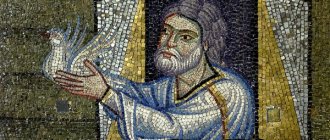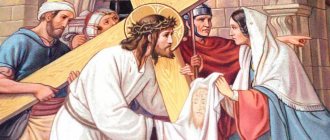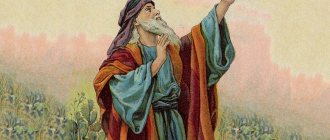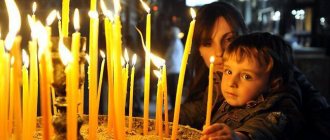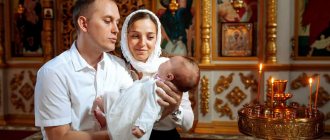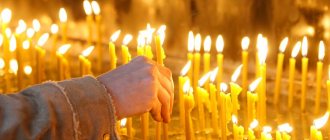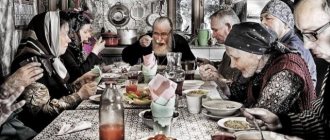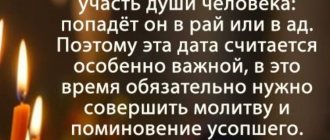For many centuries, the biblical story of the generational curse imposed by Noah on his grandson has haunted the minds of millions. According to Scripture, the patriarch, having tasted the wine, became very drunk and fell asleep naked in his tent.
Ham, one of his sons, seeing his father in an indecent form, hastened to tell his brothers about it. For this act, Noah cursed Canaan, the son of Ham...
This event took place several thousand years BC. So, who are Noah and Ham and why did the patriarch curse his grandson and not his son, the culprit himself, and what was Ham’s sin - this will be discussed in our article.
Noah is the only righteous man in his generation
Noah, mentioned several times in the Bible, belonged to the tenth generation of Old Testament patriarchs, descended in a direct line from Adam. The Orthodox Church honors him as a Saint.
Forefather Noah, Byzantium, XIV century. Master: Manuel Panselin, location: Greece. Athos, Kareya, Protat, Church of the Assumption of the Virgin Mary
Being the only righteous and blameless in his generation, Noah was saved by the Lord from the Flood and chosen for the revival of the human race.
The global flood destroyed humanity on earth, only Noah and his family, by the will of God, were saved
According to the Bible Scripture, God, seeing how great the corruption and bitterness of people was, decided to take the life of every creature on earth. Only Noah did He inform him of his decision in advance.
The Lord commanded the righteous man to build an ark to save his family and all types of animals and birds, two from each species, from the Flood,
"to preserve the tribe for the whole earth."
(Gen. 7:2-3)
The forefather accepted God's commandment with faith and, ridiculed by those around him, began to build the ark.
Noah and his sons built the ark for a hundred years.
At the beginning of construction, the righteous man was 500 years old and had three sons - the eldest, Shem, the middle, Ham, and the youngest, Japheth.
Noah became a father late in life. Having witnessed the fall of mankind for a long time and foreseeing its destruction, he did not want to have children and only at the behest of the Lord entered into marriage.
The sons of righteous Noah - Shem, Ham, Japheth
After completing the construction of the ark, God commanded Noah to board it, taking with him all the members of his family, all the animals and birds in pairs, and all kinds of food.
The righteous man was six hundred years old when the Flood began. For forty days and nights, rain poured down on the earth - the highest mountains were covered with water, the level of which rose for another hundred and fifty days, destroying all people and animals. Only the inhabitants of the ark were saved.
The Flood destroyed almost all life on earth, only Noah and those who were with him in the ark remained alive
According to Scripture, after the flood there was only one race left on earth - the righteous Noah. The Lord blessed the forefather and his descendants, and commanded them to be fruitful and multiply, and not allow bloodshed. On the land, purified by the waters, only pious people were now supposed to live.
Noah, his sons - Shem, Ham and Japheth, became the ancestors of all subsequent generations. After the flood, Noah lived another three hundred and fifty years, until he was nine hundred and fifty years old. He was the last one to reach such a ripe old age.
A book has been published based on the site's materials. "There is a lot of harvest..."Abbot Vladimir Maslov, Moscow, ed. “Izvestia”, 2022 555 pages, circulation 500 copies.
The book can be purchased in the icon shop of the monastery of St. Catherine, Vidnoye
It is also possible to subscribe to site news. See left column
Anyone who has ever won knows how sweet the joy of victory is! For some it may be victory in sports competitions, for others it may be victory over competitors in business, for others it may be solving a difficult problem or passing an exam, for others it may be the mutual feeling of a loved one... People so want to be successful, they so want to be the first! But not many strive for victory, because the bitterness of defeat is also well known to everyone.
Victory in our minds is most often associated with struggle, and where there is struggle, there is, most often, hostility, anger, envy, malice. What should a peaceful man do? Is the joy of victory really inaccessible to him? - No, of course, it is available, and the joy is immeasurably greater, for he can become a participant in the Cause, which has already won once and will definitely win. Now it’s final. It is about the Victory of love over hate and truth over error.
The New Testament, given by the One who conquered the world and conquered death, is a guide to action, “the handbook of the Conqueror.” However, only those who understand the language of the Bible can use this manual successfully. I hope that the site “By its fruits you will know a tree” will help you get acquainted with this language - the language of meanings.
In the meantime, I will make one important note. This language is not given to everyone. Read the promises below and think about whether Christ is addressing you, is He speaking to you?
“...to him who overcomes I will give to eat from the tree of life, which is in the midst of the paradise of God.” (Rev. 2.7)
“...he who overcomes will not be harmed by the second death.” (Rev. 2:11)
“...to him who overcomes I will give to eat the hidden manna, and I will give him a white stone, and on the stone a new name written, which no one knows except the one who receives.” (Rev. 2:17)
“Whoever overcomes and keeps My works to the end, to him will I give authority over the Gentiles, and he will rule them with a rod of iron, like pottery vessels; they will be broken, just as I received authority from My Father; And I will give him the morning star." (Rev. 2:26-27)
“He who overcomes will be clothed in white; And I will not blot out his name from the book of life, but I will confess his name before My Father and before His angels.” (Rev. 3.5)
“He who overcomes will I make a pillar in the temple of My God, and he will no longer go out; And I will write on it the name of My God, and the name of the city of My God, the new Jerusalem, which comes down out of heaven from My God, and My new name.” (Rev. 3:12)
“To him who overcomes I will give to sit with Me on My throne, just as I also overcame and sat down with My Father on His throne.” (Rev. 3:21)
“He who overcomes will inherit all things, and I will be his God, and he will be My son.” (Rev. 21.7)
“The last enemy to be destroyed is death...” (1 Cor. 15:26)
Other options for the main article:
4 2 3
You can place my banner on your site. It will look like this:
Here is his code:
Ham, middle son of Noah, brother of Shem and Japheth
The Bible says:
“The sons of Noah who came out of the ark were Shem, Ham and Japheth.”
(Gen.9:18)
Ham - one of Noah's three sons
The patriarch's middle son was born 100 years before the Flood, when his father was already almost 500 years old.
Like all the survivors, he set foot from the ark on the slopes of Mount Ararat and lived for a long time in the land of Shinar. His wife Yuga (Neelatamek) bore him four sons Cush, Mizraim, Puth and Canaan.
Ham is called the ancestor of the four races that descended from his sons and inhabited the regions of southern Asia and the upper Nile.
The Egyptians, Ethiopians, Libyans, Somalis and the entire Negroid race descended from him, and they call them Hamites. The Philistines, Phoenicians, and Canaanites are also his descendants.
According to the biblical account, Ham behaved shamefully towards his father, for which Noah cursed his youngest son Canaan.
Noah and Ham: the biblical story of the generational curse
According to the Bible, the first thing Noah did when he came out of the ark was to offer a sacrifice of thanksgiving to God. This was an animal sacrifice by burnt offering.
Noah brings sacrifices to the Lord in gratitude for his salvation
Then the Lord blessed the righteous man and his family and made a Covenant with him. He bequeathed to them to be fruitful and fill the earth, and also to never allow bloodshed.
The symbol of the covenant was the rainbow, which became a kind of guarantee that people would no longer be destroyed by water from the earth. Since then, it has served as an eternal reminder to man of God’s promise.
Coming out of the Ark, Noah began to cultivate the land, planted vineyards and invented the art of making wine. One day, heavily intoxicated with wine, he fell asleep naked in his tent.
Ham, who accidentally saw his father's nakedness, left him in this form and, laughing, hastened to tell his brothers about what he had seen.
They, in turn, showed deep respect for their parent - throwing clothes over their shoulders, they came from behind, so as not to see their father’s nakedness, and covered him.
Shem and Japheth, turning their faces away, entered the tent and covered their father.
Noah, having learned about the disrespect shown by Ham, cursed and forced his son Canaan and his descendants into slavery, saying that they would become slaves of Shem and Japheth.
Noah curses Canaan for the indecent act of his father Ham
He blessed his other sons, Shem and Japheth, for showing respect to their parent.
STEPS
06 Jul 2013 | Author: .
The letter "X" and the words "ham" (rudeness), "Christian" . Here we have two words with completely opposite meanings. Oddly enough, these different words have something in common. Yes Yes. Don't be surprised, guys. This is common - their origin. They come from proper names: Christian - on behalf of our Savior Jesus Christ (Christ in translation - God's Anointed), boor - on behalf of the son of holy rights. Noah - Hama. HAM, RUDESHIP Shem, Ham, Japheth are the sons of the Old Testament righteous man who was saved with his family during the Flood. Noah not only saved his family of eight people, but also placed all kinds of animals on the ark (ship), which is called Noah's Ark. One day his son Ham outraged his father so much that Noah cursed him and all his descendants. Since then, a rude, arrogant, disrespectful person has been called a boor. So what did Ham do that brought upon himself the wrath of his father? Let's read about this in the Bible: “Noah began to cultivate the land and planted a vineyard; and he drank wine and became drunk, and lay naked in his tent. And Ham saw... the nakedness of his father, and went out and told his two brothers. Shem and Japheth took the robe and, putting it on their shoulders, went backwards and covered the nakedness of their father; their faces were turned back, and they did not see their father’s nakedness.” (Genesis 9: 20-23) Here the Lord speaks in few words about the actions of Ham, but in more detail about the behavior of his brothers, who treated their father with great respect, whom they were not only afraid to condemn, much less laugh at him, and not even look at him. dared to touch upon his disadvantage. And although it is not said about Ham that he laughed and condemned his father, but only talked about him, this was already enough for severe punishment not only for himself, but for the entire family! When today we are faced with manifestations of rudeness in people, one can only shudder with fear for their fate. How low they have fallen in comparison with the founder of this phenomenon - Ham himself. Very often, children, without noticing it themselves, are disrespectful towards their parents, teachers, and simply elders. Mom and dad are sometimes called “ancestors” with a hint of irony, and teachers are given offensive nicknames; they simply stick their tongue out at unfamiliar adults who reprimand them. But all this is rudeness. And it begins with the violation of the 5th Commandment of God: “Honor your father and your mother, that good may come to you and that you may live long on earth.” And then - more. Those who do not honor their parents, who do not respect their elders, why on earth would they honor others? “Arrogance is the second happiness,” they say, but this is the deepest misconception. Let us remember the Beatitudes. The Lord does not say that those who laugh are blessed (i.e. happy). He says that blessed are those who mourn. He does not say that blessed are the proud, but, on the contrary, “Blessed are the poor in spirit.” Moreover, Christ does not say that blessed are the arrogant and rude, but states: “Blessed are the meek, for they will inherit the earth.” I liked one parable of our contemporary, the monk Barnabas (Sanin) “Rude”: “Rude went for a walk. She screamed here, got rude there. She walks away, pleased with herself. Suddenly she meets with envy. - And how are you, rudeness, doing it all so well! – as always, she began to envy. - And rudeness to her: - Oh, you, so and so! You envy everyone and everything! Well, tell me, is there anything in the world that you wouldn’t envy? I thought about envy. But then I noticed that everyone shies away from her rudeness, no one likes her, everyone finds her unpleasant. And I realized that such a thing still exists. This is rudeness. And it's true. What was there to be jealous about?” You see, guys, even envy did not envy the boorish behavior. It's very ugly! Beware, children, of rudeness! Don't be like adults who behave rudely. We are Christians, not Hamovites, and the word “Christian” is on behalf of the Savior of our souls. CHRISTIAN I once asked my students to find the differences between living plants and artificial ones. The third graders began to list with liveliness: Real flowers are more mysterious; it's interesting to wait for them to bloom; when you plant them, there are a lot of them; a whole tree appears from a small seed - it’s such a miracle; living flowers and plants have children, and this is happiness; Medicines are made from them, they are beneficial. Then we compiled table No. 1 . Thus, we found eight significant differences out of ten in favor of living plants, although it is already clear to everyone that living, real things are always more beautiful and more necessary! Then we dared to compare non-believers and believers. The kids said simple things, comparing one to another. For example, that believers wear a cross, pray, go to church, fast, confess their sins, which non-believers (even those who were baptized in childhood) do not do. The grown-up guys approached the comparison from the point of view of inner spiritual life, and we compiled table No. 2 . Having compared these two tables, both the younger and older students came to the conclusion that true Orthodox Christians are living flowers, in which there is life and growth, the fragrance of faith and love! This is all true, of course, as far as true Christians are concerned, but for us, children, it is important that you and I be living flowers, and this requires work and care. The garden of your soul must be watered, protected from the scorching rays of the sun, strong winds, and freed from weeds.
Natural flowers, Artificial №1 plants) Created by God Made by man There are living juices inside them No Grow, change No Fragrant By themselves - no Reproduce No Have properties They fall into disrepair restore Decorate the whole planet They decorate the interior, acting as a replacement for the living They are made from No medicines They make fabrics from them Can serve furniture allowance They die in winter (fall asleep) No ut) and bloom in spring
True rights Non-believers№2 nice Christians Born in baptism Created by God, but rejected from the Holy Spirit. or the grace of the Holy Spirit. Have faith in their hearts Inside is pride and into God. conceit. Striving towards the eternal They only care about life. temporary Live by the Commandments They live according to the laws of the world and and the will of God. of your own free will. The purpose of life is to purify Well-being, convenience, the soul's salvation, its salvation. pleasure. Collect spiritual Hoarding earthly wealth. wealth. They pray, they appear They don't pray, they hope members of the Church. on your own. Ready to donate Such a victim is not seen yourself for Christ's sake. sense. Best case scenario, rely on memory descendants. Bring spiritual Spirituality is seen fruit. in soulfulness. They are not afraid of death, they believe on General Resurrection.
A benevolent, godly life is not an easy, labor-intensive task. It is always easier and simpler to sin. The same monk Barnabas has a parable about this. A familiar story. “They invited a man of virtue to go for a walk. But he had a hundred reasons to refuse. And there’s no time, and my legs hurt, and I’m generally dead tired after work! - No, I can’t, don’t even ask! - The virtues are gone. And - right there, evil habits and sins. - Come for a walk with us! And what? Immediately I found time, my legs stopped hurting, and my fatigue disappeared! In a word, without hesitation, the man went with them. It would be good if this walk was temporary and not eternal!” Isn't this a really familiar story? Isn't it about us? But we are Christians, we are disciples of Christ, and we have Him on whom we can rely and ask for help. For a Christian, the norm and model in everything is Jesus Christ. First of all, we must take an example from him, look at how He acted, how He lived. In the Orthodox gymnasium, the entire group of students compiled the Gymnasium Student’s Code. There were a lot of points, and although they were all correct and necessary, I wanted to say one thing, but the most important. Remember how in the fairy tale about Frederick - one rule, and not a hundred, had to be remembered in order to become educated, it was the most important: “Remember that everyone else is better than you.” Let us remember that Christianity is following Christ, it is imitation of Him in everything and, above all, it is imitation in sacrificial love . I don’t think, children, that you don’t understand this or that it makes you despondent: here, they say, suffer, sacrifice, abstain, and others will enjoy and live for their own pleasure! After all, three little girls were able to understand this: St. martyr Faith, Hope, Love - who lived during the time of persecution of Christians. Our guys, privates of the Russian Army, who were killed in Chechnya for not going over to the side of the bandits, were able to understand this, and one of them, Evgeny Rodionov, was beheaded because he did not take off his Orthodox cross! They didn’t reason like this: why should we suffer when our peers are now drinking cocktails in cafes and watching TV? They didn’t reason: why us? They thought differently: who, if not us? Therefore, these simple Russian guys are the true disciples of Christ. It was about them that He said: You are the salt of the earth! You are the light of the world! That is why today monuments are erected to these warriors, chapels are built, icons are painted. What joy on earth and in heaven that our Rus' has not yet run out of holiness, that everything has not yet become mired in godlessness, idleness and rudeness. Let us courageously face the truth: every Christian will suffer in life, everyone must bear his own sorrows, and only the one who endures everything to the end will be saved. And if today you are offended by someone, deprived of something, if you cannot do what you would like, if you are treated unfairly and even cruelly, if you are abandoned by friends and loved ones, if you suffer from illness, remember Christ ! Be attentive to everything that happens. Do not pay for pleasure, convenience, comfort and temporary well-being with your immortal soul. Remember Christ, Christian, and bear your cross with dignity. As Abbess Parthenia writes:
To the Christian , Christ, we crucify, forgave and prayed, But aren’t you in a hurry to take revenge on your enemies? Christ was not ashamed to accept blows, but are you not ashamed to forgive insults? Christ and persecution, and labor, and adversity, And for your sake he bore the cross with love, And for His sake you trampled on your passions? Has Christ your King reigned in you?
Prepared by Sofia NIKULINA
td valign=”bottom” width=”1″
There are several speculations regarding the question: Why did Noah curse Canaan and not Ham?
Noah woke up from his wine and learned what his youngest son had done to him, and said: Cursed is Canaan; He will be a servant of servants to his brothers. (Gen. 9.24-25)
Canaan son of Ham
Over the centuries, this biblical story of a curse has caused much controversy. What is Ham's sin? Why did Noah curse Canaan and not his son?
John Chrysostom suggests that the righteous man, the father of Ham, could not break the blessing given by the Lord to him and his family with a curse. But it was still necessary to punish his son for the indecency of his act.
Righteous Noah punished Ham through his son Canaan.
More than anyone else, Canaan embodied the typical traits of his father and was especially dear and close to him. Thus, it was by cursing the son of Ham that the patriarch inflicted the most severe punishment on him. This was Ham's fatherly curse.
Speaking about the intoxication of his forefather, John Chrysostom notes that the Bible “gives him a complete excuse.” According to him, the righteous man did not know what harm drinking wine could bring him.
Blessed Theodoret also sees in this a just reward for Ham. Having sinned against his father, he received punishment through the curse of his son.
Noah's curse came true - the Canaanites were either exterminated or conquered by the descendants of Shem.
Others, referring to what is said in Scripture: “Noah woke up from his wine and learned what his younger son had done to him,” suggest that by “lesser son” they mean Noah’s grandson Canaan, the youngest of all his grandchildren.
Since it is known that Ham was the middle son of a righteous man, born after Shem, and Japheth was Ham’s younger brother.
It was Canaan who first saw the indecent position of the righteous old man. Laughing, he pointed it out to his father, who, in turn, instead of covering his nakedness, thereby showing his parent due respect, hastened to tell everything to his brothers.
Proponents of this opinion believe that Canaan, who committed evil, was cursed not because of his father, but because of his own transgression. Although they do not consider the punishment completely fair, because Canaan was still at a young age.
The Curse of Noah and the Skin Color of the Canaanites
Let me now answer part of the question about the curse of Canaan and the possible connection with black skin color. Unfortunately, some extremist and racist groups use this passage from the book of Genesis to support their racist message. They say this passage supports the idea of slavery. Nowhere in the Bible does it say that the sons of Canaan will be dark-skinned. The Bible never associates black skin with evil, so if I were you I'd be skeptical about where you came up with this idea.
By the way, the Book of Mormon also specifically associates black skin with a curse from God. It may even be that the Book of Mormon became the original source of this racist idea. This is one of hundreds of reasons to completely reject the Book of Mormon, despite the fact that Mormons themselves consider it the word of God. Once again, if I were you, I would stay away from the idea of associating black skin with a curse from God.
The name Ham is a common noun; its derivative is the concept of “rudeness”
The origin of the word “ham” is associated with the name of the biblical character, Ham, the middle of the three sons of the righteous Noah.
However, over time, its meaning gradually changed, turning into a word meaning such negative qualities as arrogance, rudeness, and deep disrespect for one’s neighbor.
Translated from Hebrew, “ham” means “passion”, “ardor”.
According to Scripture, the biblical Ham saw his father sleeping naked in his tent. Instead of showing him the respect he deserved - covering his father's nakedness, he hastened to tell his brothers about it.
Ham's spoiled nature is seen in his action: not embarrassed by what he saw and without doing anything, he hastened to expose his father in an unsightly light in front of his brothers.
At the same time, he experienced an evil joy in the humiliation of a parent, a pride consoled by the fall of another.
Ham's disrespect for his parent not only brought a curse on his son Canaan and his descendants, but also made him a household name.
Boorish behavior gave rise to the concept of “rudeness.”
For a long time, rudeness was considered a characteristic feature of the lower classes. In Vladimir Dahl's dictionary, “khamuga” is an abusive nickname for lackeys, serfs or servants; serf.
Over time, the meaning of the word gradually changed and began to mean a peculiar characteristic of a person’s behavior pattern - ill-mannered, arrogant, rude.
2 proverbs about rudeness:
- “By beard is Abraham, but by deeds is Ham.”
- “There will be no master from a boor.”
In the modern world, to act boorishly means to behave discourteously, shamelessly, in the harshest form, towards another person.
This meaning for the word “boor” is typical for many languages of the world.
By leaving a comment, you accept the user agreement
